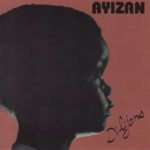
Mystical, otherworldly, Haitian rara and vodun funk from composer Alix Pascal. Under the group Ayizan, Alix moved away from his earlier beginnings in the mannered, rural musical style from the tropics called compas into something with far longer stretches/reaches: the music of Africa and post-slavery Hispaniola. Ayizan’s work in Dilijans (creole word for diligence) combined heavy Afro-funk with a very deep, Haitian tradition in modal jazz to produce something that sounds like little else.
To understand Ayizan, one must understand their leader Alix Pascal. Alix begun his career as a guitarist backing up and arranging for various Haitian jazz and rock groups like the Tabou and Ibo Combos or Les Skah Shah. As he grew into his own career, an altercation with a thief left him with a bullet in his spine, paralyzed from the waist down for the rest of his life. Rather than quit his career, this act made him determined to really figure out and discover the ancestral music of the Haitian diaspora.
Convening a new musical group he’d dub them “Ayizan”, after the name of one the four natural forces (Mother Earth) found in the vodun creation story. Moving away from a compas structure, Alix looked at the music and makeup of Haitian rara marching processions for inspiration. Rara, was Haiti’s answer to the Brazilian samba tradition. Rara would allow Ayizan to create their own style of Haitian funk.
Rara itself valued using all sorts of shaking percussion and all manners of wind instruments to create a cacophony of sound that approaches a hypnotic trance. Very similar to the call-and-response of Nigerian music, rara music added an extra space for free improvisation and for further complexity to be added (or removed) as the audience following the procession grew or dwindled in participation.
A truly gorgeous style, when adapted, rara, as Alix was able to do, with electric guitar, into a small jazz group format, lent itself to creating very introspective, contemplative, bubbling grooves. Using the full extent of the sung, creole language and reinterpretation of tradition, Ayizan is truly a treat to those who can hear the wonderful melodic phrasing the Haitian language (especially in Alix’s soft vocal range) adds to this music. If you squint your ears (I know, I’m asking for the weirdest imagination!) you can even hear the languid ideas of Brazilian Bahian styles sneak in there.
Dilijans, Ayizan’s sole release, perfectly captures an unique sound that few have realized how to expand upon. Mixing traditions from the Caribbean, Latin America, and Africa, Ayizan had to privately press this record themselves as the economies of their homeland (and the ignorance of the mainland, in the U.S.) prevented them from finding anyone willing to strike a deal that would have allowed them to go even further. Rescued from the vaults this is one album that no one should pass up.
”I am bringing this music from the street to the stage,” Mr. Pascal said. ”Most Haitian musicians trying to deal with contemporary music came out with a collage, with outside music on top of their own music; it doesn’t work. I had to go back to the roots and really assimilate the melodic concept of rara, and the free and open sense of harmony, and then find the right language to express it on bass and guitar. The song forms are also related to Haitian traditions – they use a lot of call-and-response. It’s funky, but it’s not the funk you’re used to.”
”This music is so rich compared to compas direct,” he said. ”There’s so much you can do. With compas, it’s as if you have a gold mine somewhere, but you are still counting the pennies in your pocket.”
- Alix Pascal, to the New York Times.

2 responses
damn beautiful
So freaking good. Thanks for sharing.